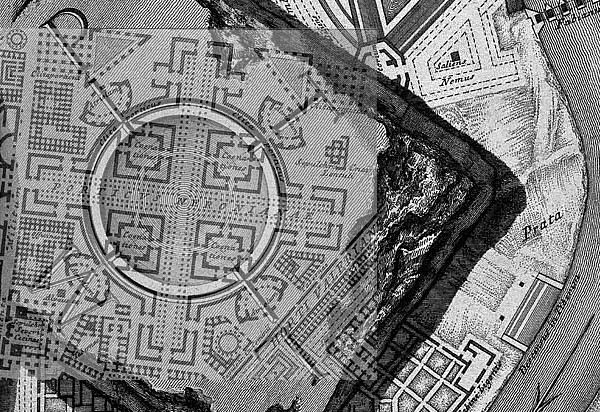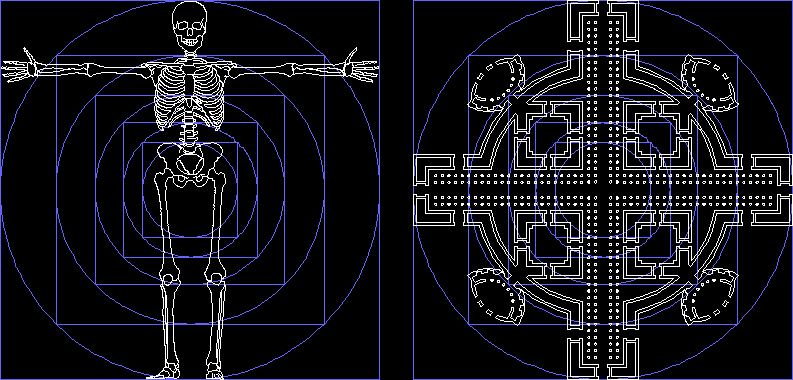2013.12.18
18 December
Reading 'conceptio' (a feminine noun) means (1a) a comprehending; hence concretely, a circuit, compass: the system of the universe [and here Vitruvius is cited as the source of the concrete meaning] again today made me wonder anew as to the significance of the compass of the Ichnographia matching exactly the plan of the Porticus Neronianae.

Was Piranesi covertly delineating the "system of the universe?"

1994.12.18
238.
In just skimming through Mircea Eliade's The Sacred and the Profane, I am finding all kinds of connections to The Timepiece of Humanity. In fact, it seems as if I could find all the reinforcement for my story just in that book. Right now I am just going to take notes from the chapter entitled "Human Existence and Sanctified Life," especially where it concerns the "second birth."
239.
"...As we saw (Chapter 2), the cosmogonic myth is recited for therapeutic purposes. To be cured, the victim of an illness must be brought to a second birth, and the archetypal model of birth is the cosmogony. The work of time must be undone, the auroral moment immediately preceding the Creation must be reintegrated; on the human plane, this is as much as to restore the "blank page" of existence, the absolute beginning, when nothing was yet sullied, nothing spoiled."
Mircea Eliade, The Sacred and the Profane (New York: Harcourt, Brace & World, 1957), p. 195.
This passage brings to mind how the the heart and lungs predominate immediately after the second birth. The lungs themselves are organs that manifest the idea "when nothing was yet sullied, nothing spoiled." I myself have already, and repeatedly, referred to the era of the heart and the lungs as a whole new order, and this is the same as "...the auroral moment immediately preceding the Creation must be reintegrated."
This passage also contains the idea that "a second birth" is a cure for an illness. I'm not sure if this applies to the Timepiece, however I do see a distinct difference and contrast between metabolism and osmosis. The era of pluralism and metabolism may indeed seem like an illness when compared to the state of being within the realm of osmosis.
The definition of cosmogony is the creation, origination, or manner of coming into being of the world or universe.
240.
"Initiatory death reiterates the paradigmatic return to chaos, in order to make possible a repetition of the cosmogony--that is, to prepare for the new birth. Regression to chaos is sometimes literal... This psychic chaos is the sign that the profane man is undergoing dissolution and that a new personality is on the verge of birth."
Mircea Eliade, The Sacred and the Profane (New York: Harcourt, Brace & World, 1957), p. 196.
This passage introduces the idea of a death, a chaotic situation, a profane experience that is necessary before "a second birth" A few things come to mind. One, the chaos may relate to the pluralism of the upper digestive system, and in turn, the era of metabolism may be a profoundly profane era. Two, the chaos may also relate to the pain and torturous suffering of actual childbirth. This pain and suffering, this "chaos" is only experienced by females, and this fact may play a role in the overall equal role that I see women playing after the second birth. And third, I see the "new personality" as perfectly describing the whole new order manifested by the lungs and the heart.
241.
"The scenario of initiation--death to the profane condition, followed by rebirth to the sacred world, the world of the gods--also plays an important role in highly evolved religions."
Mircea Eliade, The Sacred and the Profane (New York: Harcourt, Brace & World, 1957), p. 197.
This passage further reinforces, and gives another name to, the transition from metabolism to osmosis. Along these lines metabolism = profane and osmosis = sacred ("world of the gods"). This overlay of reinforcing layers of symbols, beliefs, and interpretations seems to attest to the significance of the future time, 3090 AD.
242.
"Sacred knowledge and, by extension, wisdom are conceived as the fruit of an initiation, and it is significant that obstetric symbolism is found connected with the awakening of consciousness both in ancient India and in Greece. Socrates had good reason to compare himself to a midwife, for in fact he helped men to be born to consciousness of self; he delivered the "new man.""
Mircea Eliade, The Sacred and the Profane (New York: Harcourt, Brace & World, 1957), pp. 198-99.
Obstetrics, of course pertains to the whole nature of birth. In the Timepiece, I feel I am going a step beyond symbolism and relating the "second birth" directly to where pregnancy occurs within the human body. What isn't said by Eliade (and others) is the premier role of women after the "second birth," because it is the female body that will nurture the "second birth." Plato can compare himself to a "midwife," but in actuality, no male can produce a birth.
243.
"From one religion to another, from one gnosis or one wisdom to another, the immemorial theme of the second birth is enriched with new values, which sometimes profoundly change the content of the experience. Nevertheless, a common element, an invariable, remains. It could be defined as follows: access to spiritual life always entails death to the profane condition, followed by a new birth."
Mircea Eliade, The Sacred and the Profane (New York: Harcourt, Brace & World, 1957), p. 201.
This is Eliade's conclusion to the topic of the second birth. Again it ties in perfectly with the Timepiece. My only reservation, thus far, is the negative idea of death, and in this case death to the profane. Is the era of metabolism really so profane, and likewise, is the era of osmosis so sacred? It is admitted simplistic to make the connection between metabolism/digestion and mundane/profane animal necessity, but are the workings of the lungs and the heart all that sacred? Or perhaps better put, are the working of the lungs and heart not also profane?
So far I do believe that there will be a great difference, on all counts, between metabolism and osmosis. And I even believe that osmosis is a positive step up from metabolism.
|